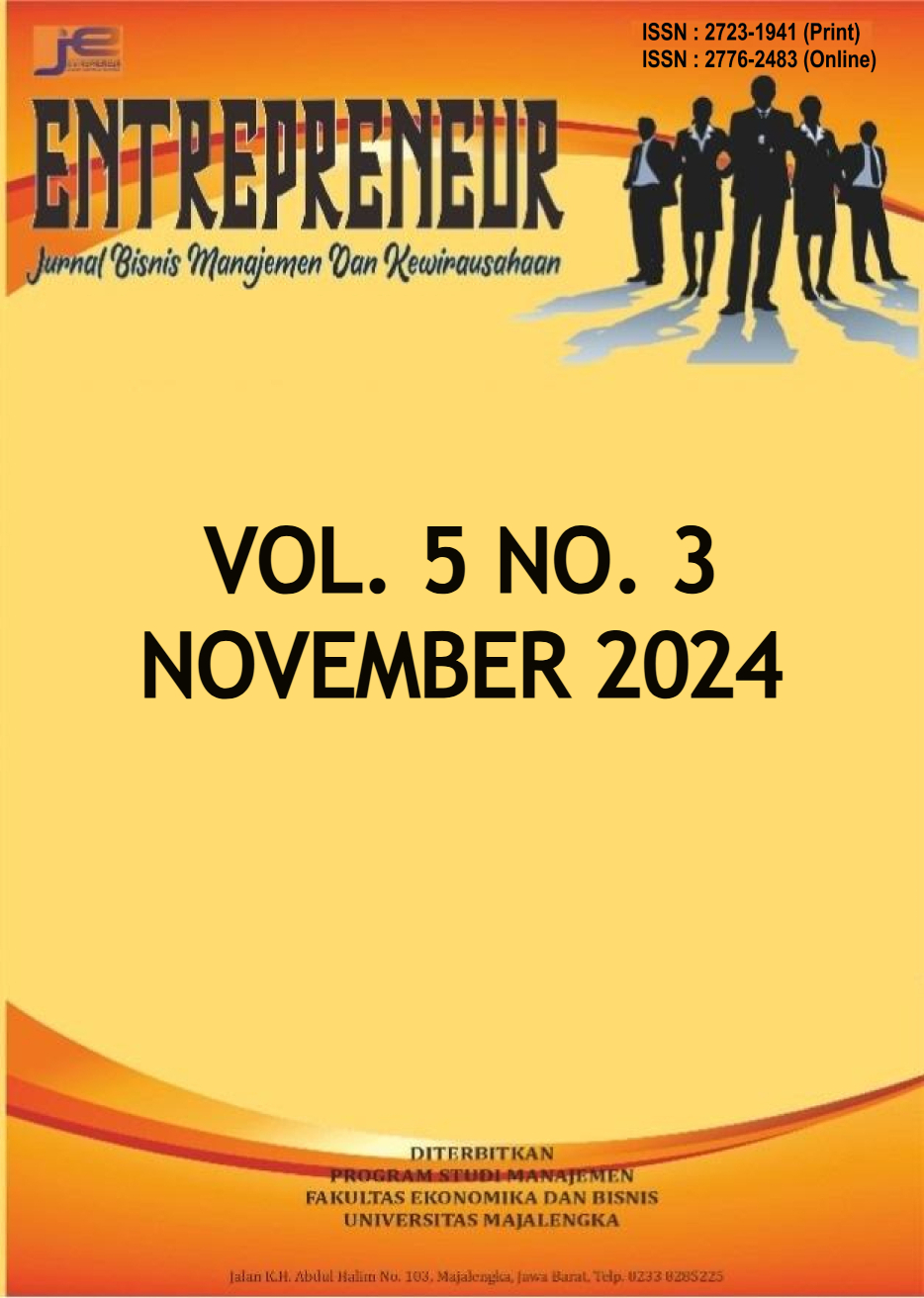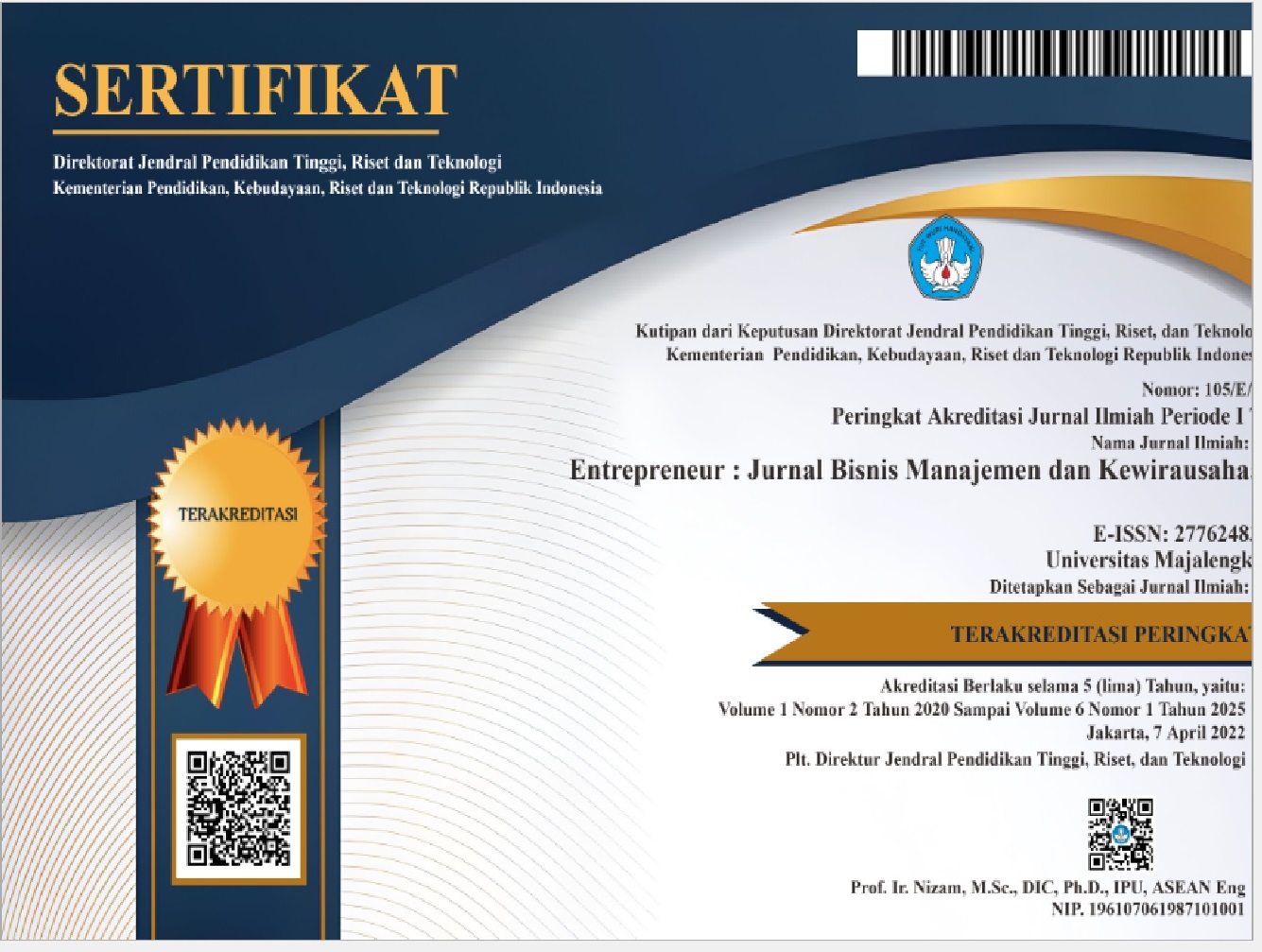Pengaruh Insentif terhadap Kinerja Karyawan Dengan Masa Kerja Sebagai Variabel Moderasi Dikantor Pusar Redaksi Harian Pagi Lamongan
DOI:
https://doi.org/10.31949/entrepreneur.v5i3.12049Abstract
This study aims to analyze the effect of incentives on employee performance with work tenure as a moderating variable at the Central Office of the Lamongan Morning Daily Editorial Office. Using a quantitative approach with regression analysis, this study involved 50 employees as respondents. The analysis results show that incentives have a positive and significant effect on employee performance (t = 2.406; p < 0.05). However, work tenure does not moderate the relationship between incentives and employee performance (t = 0.050; p > 0.05). This study concludes that incentives are an important factor in improving employee performance, but the role of work tenure is not significant in strengthening this relationship. The practical implication of this study is the need for the company to design effective incentive strategies to enhance employee productivity, regardless of their work tenure.
Keywords:
Incentives, Employee Performance, Work Tenure, Moderating VariableDownloads
References
Anwar, M., & Firmansyah, T. (2021). Work experience as a moderator of the effect of rewards on employee performance. Journal of Contemporary Management Research, 13(3), 89-102.
Darianto, Musarofah, S., & Lestari, A. (2022). Pengaruh kompensasi finansial dan motivasi mengajar terhadap kinerja Guru SMK Wahid Hasyim Glagah. 5(1), 757–765.
Hermawan, F., & Sari, D. (2023). Incentives and organizational commitment: The mediating role of employee satisfaction. Jurnal Ilmu Manajemen Terapan, 9(2), 34-49.
Hidayat, T., & Kusuma, H. (2022). The role of non-financial incentives in building employee loyalty and performance. Journal of Organizational Studies, 11(2), 56-70.
Kurniawati, D., Setiawan, A., & Rahmawati, L. (2022). Masa kerja sebagai moderasi pengaruh insentif terhadap kinerja karyawan. Jurnal Manajemen dan Bisnis Indonesia, 8(1), 12-24. Lestari, P., &
Nugraha, A. (2021). The effect of employee incentives on productivity in media companies. Indonesian Journal of Management and Business Studies, 10(3), 150-165.
Mangkunegara, A. P. (2021). The impact of incentives on employee performance: A case study in media organizations. International Journal of Human Resource Development, 5(2), 45-60.
Nugroho, T., & Putri, S. (2023). The role of work experience in shaping employee responses to incentives. Asian Journal of Management Studies, 10(3), 78-92.
Priyono, D., & Wulandari, S. (2021). Effect of incentives on employee performance in creative industries. Jurnal Ekonomi dan Manajemen Indonesia, 7(3), 67-75.
Rahmat, T., & Handayani, F. (2022). Moderating role of work tenure on the relationship between job satisfaction and employee performance. Journal of Business and Workforce Development, 14(1), 45-60.
Rini, N., & Purnomo, S. (2020). The relationship between employee motivation, rewards, and job performance: An empirical study. Jurnal Bisnis dan Manajemen Kontemporer, 15(1), 78-95.
Susanto, R., & Arifin, Z. (2020). Financial and non-financial rewards: Impact on employee motivation and job performance. Asian Journal of Business Management, 8(4), 121-135.
Suryani, R., & Harjono, T. (2020). Incentive systems in high-stress work environments. Journal of Organizational Psychology, 12(4), 150-165.
Yusuf, F., & Karim, A. (2021). Employee retention and performance: The role of incentives and moderating factors. Journal of Business Strategy, 15(2), 101-115.

Published
How to Cite
Issue
Section
License
Copyright (c) 2024 Sahari, Siti Musarofah, Arian Yusuf Wicaksono

This work is licensed under a Creative Commons Attribution-ShareAlike 4.0 International License.
COPYRIGHT NOTICE
An author who publishes in the Entrepreneur: Jurnal Bisnis Manajemen dan Kewirausahaan agrees to the following terms:
1. Author retains the copyright and grants the journal the right of first publication of the work simultaneously licensed under the Creative Commons Attribution-ShareAlike 4.0 License that allows others to share the work with an acknowledgment of the work's authorship and initial publication in this journal
2. The author is able to enter into separate, additional contractual arrangements for the non-exclusive distribution of the journal's published version of the work (e.g., post it to an institutional repository or publish it in a book) with the acknowledgment of its initial publication in this journal.
3. The author is permitted and encouraged to post his/her work online (e.g., in institutional repositories or on their website) prior to and during the submission process, as it can lead to productive exchanges, as well as earlier and greater citation of the published work







